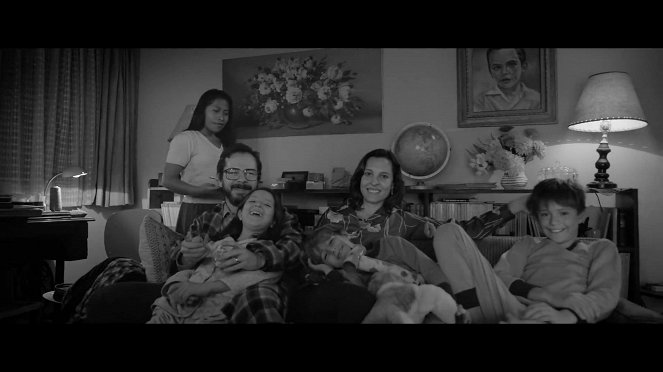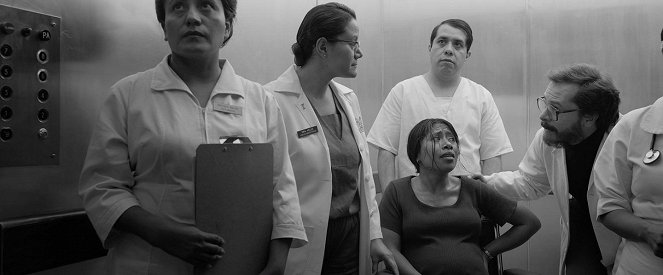Directed by:
Alfonso CuarónScreenplay:
Alfonso CuarónCinematography:
Alfonso CuarónCast:
Yalitza Aparicio, Marina de Tavira, Diego Cortina Autrey, Carlos Peralta, Marco Graf, Daniela Demesa, Nancy García García, Verónica García, Andy Cortés (more)VOD (1)
Plots(1)
With his eighth and most personal film, Alfonso Cuarón recreated the early-1970s Mexico City of his childhood, narrating a tumultuous period in the life of a middle-class family through the experiences of Cleo (Yalitza Aparicio, in a revelatory screen debut), the indigenous domestic worker who keeps the household running. Charged with the care of four small children abandoned by their father, Cleo tends to the family even as her own life is shaken by personal and political upheavals. Written, directed, shot, and coedited by Cuarón, Roma is a labor of love with few parallels in the history of cinema, deploying monumental black-and-white cinematography, an immersive soundtrack, and a mixture of professional and nonprofessional performances to shape its author’s memories into a world of enveloping texture, and to pay tribute to the woman who nurtured him. (Criterion)
(more)Videos (1)
Reviews (13)
The surreal power of this film, I think, stems from three things. The first is actually a very ordinary story of a completely awkward main protagonist, which is almost documentary-authentic, personal and 100% impressive thanks to the ordinariness and the awkwardness. The second thing is, without exaggeration, the masterful direction of Alfonso Cuarón. That really needs to be seen. You could create the perfect art photograph from perhaps every shot, it's all thought out to the smallest detail and the black and white camera with the hearty help of sound (something we can't see at all, just we hear it) makes it a feast for the eyes (for example the monumental forest fire scene). The third thing is how the story and presentation “work together" - everything is natural, long camera rides or still shots do not distract from what's happening right now, the scenes beautifully complement each other, form a single whole, etc. I was originally expecting something from Roma in the style of Tornatore’s Malena. It's a completely different film though, completely great in a different way. And the scenes in the maternity ward or on the beach... You simply do not forget them.
()
Roma isn’t love at first sight, it’s not a film that would hook me in the first minutes keep me hooked all the way till the end. But, after two or three days, it did grow on me. Cuarón this time delivers a detached view into a couple of months of the life of a broken Mexican family, mainly that of their maid, Cleo. The story takes place in a sort of by the way manner, with the camera following relative “non-stories”. But each of those fragments compose a surprisingly rich mosaic of human destinies and by the end the viewer must acknowledge that a lot has actually happened. The similarities with Czech films that in the microcosm of one family tell wider stories with a universal reach are not entirely out of place. Watching it in the cinema is certainly worth it, the camera work and, in particular, the sound are top-notch. One of the films of the year. #svetozorcinema
()
Roma will not chew the viewer and make them bite their nails in tension, nor does it reminisce the type of ode to human suffering sung by the unfortunate protagonists of, for instance, Bicycle Thieves. And yet it is beautiful. It’s a film about emotions so real that in the cinema I felt a chill on my spine every time I remembered I was just watching a film. A sensitively slow narrative where the consequences are not as important as experiencing the present and empathy towards the main character. The style reflects that – the long shots and the impressive depth of the composition of the scenes, whose staging and sound design let the viewer wander in that space together with the characters to fully savour the emotions that the narration carefully prepares and foreshadows (the closing cleanse in the sea). Even though I didn’t feel the coveted cinephile bliss, I fell in love with Roma for its authentic portrayal of human togetherness and for its world, which can be inhospitable, unpredictable and loving at the same time. The direction and the cinematography are awesome.
()
A normal viewer who seeks spectacle and entertainment while watching movies will most likely be unimpressed by Roma. However, I think that for festivalgoers and a club audience, the film will represent the embodiment of what an artistic film should be. It was filmed in a similar manner as in the 60s and 70s when authorial and autobiographical works were in their prime and enlightened producers invested in them without hesitation. It was a time when directors commonly cast non-actors, and Cuarón does the same here. He is not afraid of improvisation, and the same goes for the Mexican directorial star. Roma feels genuine and authentic. Granted, I am not an expert, but the atmosphere of Mexico City in the early 70s seems perfect to me, as well as the casting. Cuarón must have paid maximum attention to the casting, and Yalitza Aparicio does not play the role of a servant, she simply is one. Devoted, resigned to her position, slightly naive, intoxicated by her first sexual adventure, and confused by the subsequent indifference. Her presence and precise camera work are the director's greatest weapons. The black and white visuals refer to the era of European art film of the 50s and 60s. In many shots, it felt as if I was watching a documentary from that time in the Mexican capital. Thanks to the monumental visual compositions, Roma should be seen on a big screen, which I managed to do after a long search. I would even dare to say that it loses a significant amount of impact on a small screen. It is a slowly flowing intimate film that, although not feminist in nature, mostly depicts the world and emotions of women. Overall impression: 85%.
()
The best works of the Czechoslovak new wave (although Fellini would know one in that) has just grown to include a related Mexican cousin, who in the circles of “more demanding" viewers can perhaps not even evoke many captivating Mexican waves. Which is so telling that I will forgive the originally intended hymns for every single aspect, from non-actors through filming and sounding to the sophistication of the narrative, which completely fulfills the saying “the devil is hidden in the details". What Cuarón, as a screenwriter / cinematographer / director, can “as if inadvertently" do in mise-en-scène (or purely noise outside the picture) in mere hints, is more than admirable. To make matters worse, despite the seemingly primordial coldness, this “celebration of ordinary strong women in our lives" is also captivating and arousing emotions like a few movies in recent years. Roma looks like a film that was five decades earlier. However, thanks to its qualities, it would not be forgotten, even if it was actually created fifty years ago. On the contrary, it would be lovingly remembered in the intentions “such master pieces are unfortunately no longer filmed today". Thanks to Cuarón, however, this is not the case; and for that one must be infinitely grateful, whether ultimately Roma is his cup of coffee or not.
()



Ads